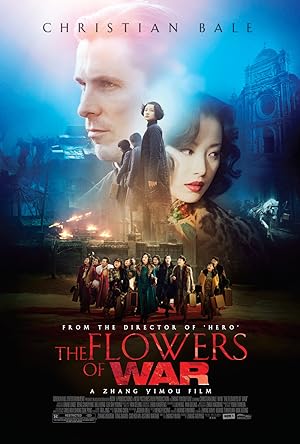I love Zhang Yimou and plan to see all of his films, but when I watched The Flowers of War, I did not realize that he directed it until I finished watching the movie. The film was in my queue because it was about the Rape of Nanking during WWII when the Japanese invaded and brutalized China, specifically killing all men and raping all girls and women, often to death. (Why is the death by bunga bunga joke considered funny? It is problematic on so many levels.) It is an adaptation of a fictional story, which I do not plan to read.
I hope that The Flowers of War is at least faithful to the original story because I was turned off by the imposition of a standard romantic Hollywood historical epic on this particular historical event. Fiction can cheapen reality, especially when the historical figures are far more interesting than the ones created inside someone’s head. It was the second fully Chinese funded film with a Hollywood lead, but considering that Minnie Vautrin inspired the story, I’m not sure why that character is male and nothing like her. Spielberg recommended Christian Bale. Obviously Bale is a good actor, but essentially I imagine that it went something like this, “Bale lived in China when he made Empire of the Sun. He’ll do it.” What?
The Flowers of War brings a collection of characters together seek sanctuary in a Catholic cathedral: Chinese school girls, an orphan boy, an American mortician and a group of prostitutes. The only adult man standing is the mortician who though drunk, inexplicably decides to do his job in a war zone. The first section feels more like a war action film as Bale dodges obstacles, and a lone, noble Chinese soldier, who is literally an army of one. Yimou saves his most beautiful work for the sequence when the man’s heroism bursts into colors that mirror the stained glass window otherwise visually, you would have no idea that Yimou was involved.
The second section introduces the problem-essentially the chasm between who the characters are and who they want to be. There is a minor civil war among the women. The school girls fight amongst themselves regarding why they are in this predicament then the girls and sex workers argue about who should be able to benefit from the church’s facilities. Eventually the external threat posed by the Japanese soldiers unifies them, but people do a lot of stupid things during two thirds of the film. The sexual harassment turned into romantic flirtation between Bale and the lead prostitute is so absurd and unlikely. If you know that in the near future, there is a distinct possibility that you’re going to be raped to death by a battalion of soldiers, would the last thing you do is sleep with Bale, especially if as a Westerner, he does not meet your beauty standards? He has a daughter so he is not trash. OK. Sure. Side eye. It is also dissonant with the final act.
The Flowers of War’s final act is the strongest because it examines the motivations of the prostitutes, which in turn allows them to share their stories of past abuse by their fellow countryman during peacetime. It also finally explains why a random mortician needed to be in the mix instead of an actual missionary or priest. His skill becomes a tool of time travel into the past to remember who they were and into the future for who they will become, dead bodies. The prostitutes’ past is a glimpse of the schoolgirls’ future if they are not saved. The movie transforms a historical wartime atrocity into broader condemnation of the sexual abuse of women that hijacks their life choices and stigmatizes them forever.
Even though the final act is inspired by historical events and is emotionally resonant, I don’t know if it is worth it for you to sit through 2 hours 26 minutes of contrivance. The whole virgin whore, good vs. bad girl dynamic at play throughout the film is distasteful. In real life, a group of prostitutes saved other women, but were they all schoolgirls? I know that it raises the stakes in The Flowers of War, but there are no women in between. Only depicting the extremes as if women can only belong in one category inadvertently further dehumanizes women. If you have the time, watch City of Life and Death first otherwise skip it.
Stay In The Know
Join my mailing list to get updates about recent reviews, upcoming speaking engagements, and film news.





